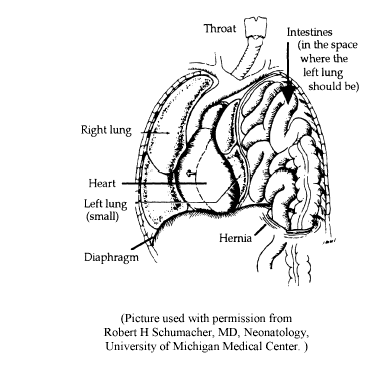Diaphragmatic hernia (congenital diaphragmatic hernia – CDH)
A diaphragmatic hernia, or congenital diaphragmatic hernia, is a defective development of the diaphragm occurring in about 1 of 2,300 births. A diaphragmatic hernia occurs when the embryonic components of the diaphragm do not fuse normally. Normally the diaphragm forms a solid layer of muscle that assists with breathing and keeps the abdominal contents from sliding up into the chest cavity. Failure of the diaphragm to fuse results in an open communication, or hole, between the abdomen and chest cavity.
As a result, the intestines and other abdominal organs pass into the chest compressing the lungs and heart. When infants with congenital diaphragmatic hernia (CDH) are born they have difficulty breathing on their own since their lungs and heart are underdeveloped from the pressure of the intestines and other abdominal contents being up in the chest cavity during fetal life. These problems can be quite serious, even life-threatening.

A few babies may have only a little problem breathing after birth and recover quickly. Most babies will be sick but can be treated with medicines, a ventilator, and if very sick, extra-corporeal membrane oxygenation (ECMO). ECMO is a heart-lung bypass machine.
Surgically repairing the hernia does not usually improve the baby’s breathing right away; it may temporarily worsen breathing problems. The doctor will determine the best time for surgery based on the baby’s overall condition. It may take a week or more for the baby’s condition to stabilize. When they are stable, surgeons perform an operation to return the abdominal contents to the belly and close the hole in the diaphragm.
This problem can be identified on ultrasound before birth. Each baby with this disease is different and many factors affect survival. It is very difficult to predict from ultrasounds and other tests done during pregnancy how well your baby’s lungs will work. Interpreting information you find while researching this problem can be difficult as well. It is best to discuss your research and the specifics of your case with a physician who regularly cares for babies with CDH.